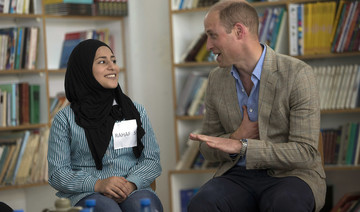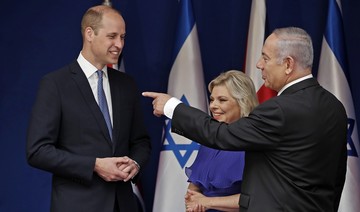AMMAN: Prince William, the second in line to the British throne, concluded a carefully planned visit to the Middle East region with visits to Jewish, Muslim and Christian sites in the Old City of Jerusalem.
The Jerusalem visit followed an important meeting in Ramallah with the Palestinian president as well as visits to a refugee camp and engagement with Palestinian social, civil and cultural communities.
On Wednesday night, the Duke of Cambridge met with about 200 Jerusalemites at the British Consulate, where he delivered one of his most important speeches in support of peace and in solidarity with Palestinians.
“The story of the Palestinian people is so often told only through the lens of difficulty and conflict,” the Duke of Cambridge said. “But there is another story which I was privileged to witness today. This afternoon in Ramallah I saw an unforgettable display of Palestinian culture and hospitality. The Dabka, the singing, and the dancing were by turns beautiful, moving and joyful.”
The prince began his tour of the Old City from the Mount of Olives in East Jerusalem. He then visited the nearby gravesite of his great-grandmother, Princess Alice, whose last wishes were to have her remains buried in the Church of St. Mary Magdalene above the Garden of Gethsemane.
After a private visit to the Western Wall, the prince was welcomed at the Haram Al-Sharif/Al-Aqsa Mosque by leaders of the Palestinian Islamic community. While on the premises of Al-Aqsa, Islamic leaders talked to him about their difficulties and aspirations.
Abel Azziz Salhab, head of the Higher Waqf Council, told the visiting prince that “what is expected from Britain is to fix the historic injustice against Palestinians.”
Mohammad Hussein, the mufti of Jerusalem, welcomed him “to the capital of the Palestinian state,” thanking the prince for not wavering on the description of Jerusalem as an occupied city.
Professor Mustafa Abu Sway, Al-Ghazali chair at Al-Quds University, gave the prince a tour of the UNESCO world heritage site explaining the importance of the third holiest mosque in Islam.
The prince appeared happy to hear about the accommodations provided to Muslim women by having them pray at the Dome of the Rock mosque while men worship at the nearby Al-Aqsa Mosque.
The prince asked about the ability of Palestinian youth from outside Jerusalem from accessing the mosque. Abu Sway told the British royal visitor that Palestinian youth are not allowed at all to visit the mosque.
“During Ramadan, men over 40 years old are allowed to visit from the rest of the Occupied Territories but youth under 40 are not allowed to visit at all throughout the year."
The Anglican primate of the Middle East, Archbishop Suheil Dawani, told Arab News that the prince was happy to tour holy sites in Jerusalem.
Dawani, who was entrusted with the Christian leg of the visit, said that he accompanied the prince from St. George’s Order in the old city to the Church of the Holy Sepulchre.
“On the way to the church, the prince was greeted by local Palestinians, including a young woman on a wheelchair whom the prince spent a considerable time chatting with,” Dawani told Arab News.
The prince visited the Church of the Holy Sepulchre and met with the Orthodox, Catholic, Armenian patriarchs of Jerusalem as well as leaders of all Christian community in Jerusalem.
Dawani told Arab News that the prince spoke about the importance of peace to all communities.
Palestinians generally were pleased with the visit of the second in line to the British throne and were delighted that the British royal stuck to his guns and did not retract the official description of the visit to Jerusalem as being part of his visit to the Occupied Territories.
While Israeli officials did not like the description, it seemed that the Israelis did not want to argue too much with the prince on this issue, a political leader in Jerusalem told Arab News.
At Jerusalem’s holy sites, Prince William talks about importance of peace to all communities
At Jerusalem’s holy sites, Prince William talks about importance of peace to all communities
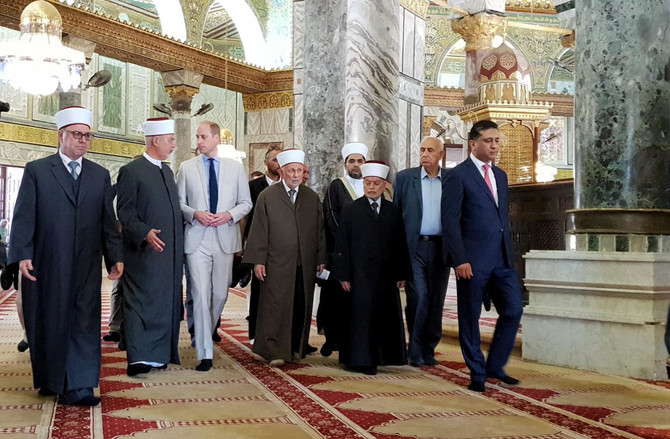
- The prince began his tour of the Old City from the Mount of Olives in East Jerusalem.
- He also visited the nearby gravesite of his great-grandmother, Princess Alice, whose last wishes were to have her remains buried in the Church of St. Mary Magdalene above the Garden of Gethsemane.
Dubai carrier Emirates suspends check-in for onward connections, flydubai cancels Iran flights

- Emirates suspends check-in for all customers in its network travelling with onward connections through Dubai
DUBAI: Dubai’s flydubai airline canceled flights to Iran on Friday after receiving an official alert, a statement said.
“In line with the issued NOTAM (notice to air missions), our flights to Iran today have been canceled,” said the statement
One flight which had already departed for Tehran returned to Dubai after the Iranian capital’s airport was closed, it added.
Flights were suspended across swathes of Iran as Iranian state media reported explosions in the central province of Isfahan.
Flight-tracking software showed commercial flights avoiding western Iran, including Isfahan, and skirting Tehran to the north and east.
Emirates meanwhile said on Friday it was suspending check-in for all customers in its network travelling with onward connections through Dubai until 2359 GMT on April 19.
Emirates, one of the world’s biggest international airlines, added that customers travelling to Dubai as their final destination may check-in and travel as usual.
Emirates and flydubai have experienced serious disruption this week after record rainfall caused more than 1,000 flight cancelations at Dubai airport, one of the world’s busiest air hubs.
Iran closes air space, commercial flights diverted after apparent Israeli retaliatory strikes

- Drones shot down over Isfahan, says Iranian state media
- Israel military refuses to comment on incident
DUBAI/WASHINGTON: Israeli missiles have hit a site in Iran, ABC News reported late on Thursday, citing a US official, while Iranian state media reported an explosion in the center of the country, days after Iran launched a retaliatory drone strike on Israel.
Commercial flights began diverting their routes early Friday morning over western Iran without explanation as one semiofficial news agency in the Islamic Republic claimed there had been “explosions” heard over the city of Isfahan.
Some Emirates and Flydubai flights that were flying over Iran early on Friday made sudden sharp turns away from the airspace, according to flight paths shown on tracking website Flightradar24.
“Flights over Isfahan, Shiraz and Tehran cities have been suspended,” state media reported.
Iranian officials said its air defenses did shot down several drones but there had been “no missile attack for now” on the country.
The state-run IRNA news agency reported that Iran fired air defense batteries early Friday morning across several provinces after reports of explosions near the city of Isfahan.
Several drones “have been successfully shot down by the country’s air defense, there are no reports of a missile attack for now,” Iran’s space agency spokesman Hossein Dalirian says on X.
The Fars news agency said “three explosions” were heard near the Shekari army airbase near Isfahan.
Iran’s local media also reported that nuclear facilities in Isfahan were “completely secure” after explosions were heard near the area.
“Nuclear facilities in Isfahan province are completely secure,” Tasnim news agency reports, quoting “reliable sources.”
Israel had said it would retaliate against Iran’s weekend attack, which involved hundreds of drones and missiles in retaliation for a suspected Israeli strike on its embassy compound in Syria. Most of the Iranian drones and missiles were downed before reaching Israeli territory.
Several Iranian nuclear sites are located in Isfahan province, including Natanz, centerpiece of Iran’s uranium enrichment program. Isfahan, Isome 350 kilometers (215 miles) south of Iran’s capital, Tehran, is also home to a major air base for the Iranian military.
Meanwhile in Iraq where a number of Iranian-backed militias are based, residents in Baghdad reported hearing sounds of explosions, but the source of the noise was not immediately clear.
In Syria, a local activist group said strikes hit an army position in the south of the country Friday.
“There were strikes on a Syrian army radar position,” said Rayan Maarouf, who runs the Suwayda24 anti-government website that covers news from Sweida province in the south.
Iranian military positions in Syria had been frequently targetted by Israeli air strikes over the past years. Early this month, an Israeli strike demolished a consular building annex of the Iranian Embassy in Sydia's capital Damascus, killing 13 people, including two generals of Iran's Revolutionary Guards, triggering the Iranian missiles and drones attack on Israel on April 13.
At the United Nations Security Council on Thursday, Iran urged member nations that Israel “must be compelled to stop any further military adventurism against our interests” as the UN secretary-general warned that the Middle East was in a “moment of maximum peril.”
Israel had said it was going to retaliate against Iran’s April 13 missile and drone attack.
Analysts and observers have been raising concerns about the risks of the Israel-Gaza war spreading into the rest of the region.
Oil prices and jumped on the reports of the Israeli strike. Brent crude futures rose 2 percent to $88.86 a barrel, the dollar gained broadly, gold rose 1 percent and S&P 500 futures dropped 1 percent.
Israel’s assault on Gaza began after Palestinian Islamist group Hamas attacked Israel on Oct. 7, killing 1,200, according to Israeli tallies.
Israel’s military offensive has killed over 33,000 Palestinians in Gaza, according to the local health ministry.
Iran-backed groups have declared support for Palestinians, launching attacks from Lebanon, Yemen and Iraq.
United States had advance warning of Israel attack on Iran: US media
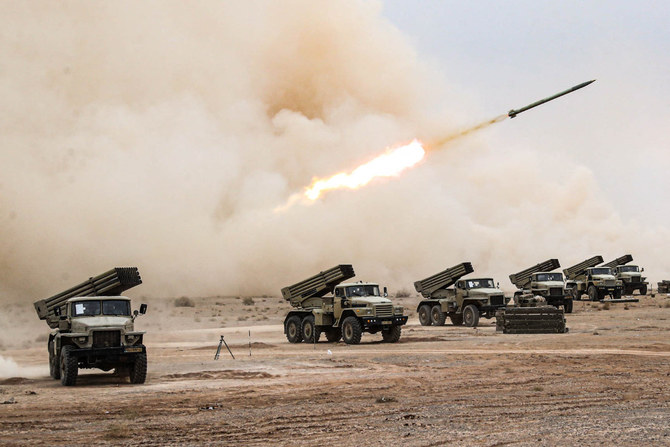
- US media: Israel had provided Washington with pre-notification of the strike
- Tehran’s two major airports resumed flights following a brief suspension
DUBAI/WASHINGTON/TEHRAN: The United States received advance notice of Israel’s reported strike on Iran but did not endorse the operation or play any part in its execution, US media quoted officials as saying.
NBC and CNN, citing sources familiar with the matter and a US official, respectively, said Israel had provided Washington with pre-notification of the strike.
Various networks cited officials confirming a strike had taken place inside Iran, with CNN quoting one official as stating the target was not a nuclear facility.
Israel told the United States on Thursday it would be retaliating against Iran in the coming days, a senior US official told CNN.
“We didn’t endorse the response,” the official said, according to CNN.
There was no immediate comment from the White House about the Israeli strike.
In response to a query from AFP, the Pentagon duty desk said: “We do not have anything to offer at this time.”
Iran activated its air defense system over several cities, state media reported, after the country’s official broadcaster said explosions were heard near the central city of Isfahan.
Israel warned it would hit back after Iran fired hundreds of missiles and drones at its arch-foe over the weekend. Most of them were intercepted.
That weekend barrage came in the wake of an attack on Iran’s consulate in Damascus widely blamed on Israel.
Tehran’s two major airports resumed flights on Friday, state media reported, following a brief suspension after explosions were heard in central Iran.
“Flights through Imam Khomeini and Mehrabad airports have resumed,” the official IRNA news agency reported.
Commercial flights began diverting their routes early Friday morning over western Iran without explanation as one semiofficial news agency in the Islamic Republic claimed there had been “explosions” heard over the city of Isfahan.
Some Emirates and Flydubai flights that were flying over Iran early on Friday made sudden sharp turns away from the airspace, according to flight paths shown on tracking website Flightradar24.
“Flights over Isfahan, Shiraz and Tehran cities have been suspended,” state media reported.
Iranian officials said its air defenses did shot down several drones but there had been “no missile attack for now” on the country.
The state-run IRNA news agency reported that Iran fired air defense batteries early Friday morning across several provinces after reports of explosions near the city of Isfahan.
Several drones “have been successfully shot down by the country’s air defense, there are no reports of a missile attack for now,” Iran’s space agency spokesman Hossein Dalirian says on X.
The Fars news agency said “three explosions” were heard near the Shekari army airbase near Isfahan.
Iran’s local media also reported that nuclear facilities in Isfahan were “completely secure” after explosions were heard near the area.
“Nuclear facilities in Isfahan province are completely secure,” Tasnim news agency reports, quoting “reliable sources.”
Israel had said it would retaliate against Iran’s weekend attack, which involved hundreds of drones and missiles in retaliation for a suspected Israeli strike on its embassy compound in Syria. Most of the Iranian drones and missiles were downed before reaching Israeli territory.
Several Iranian nuclear sites are located in Isfahan province, including Natanz, centerpiece of Iran’s uranium enrichment program. Isfahan, Isome 350 kilometers (215 miles) south of Iran’s capital, Tehran, is also home to a major air base for the Iranian military.
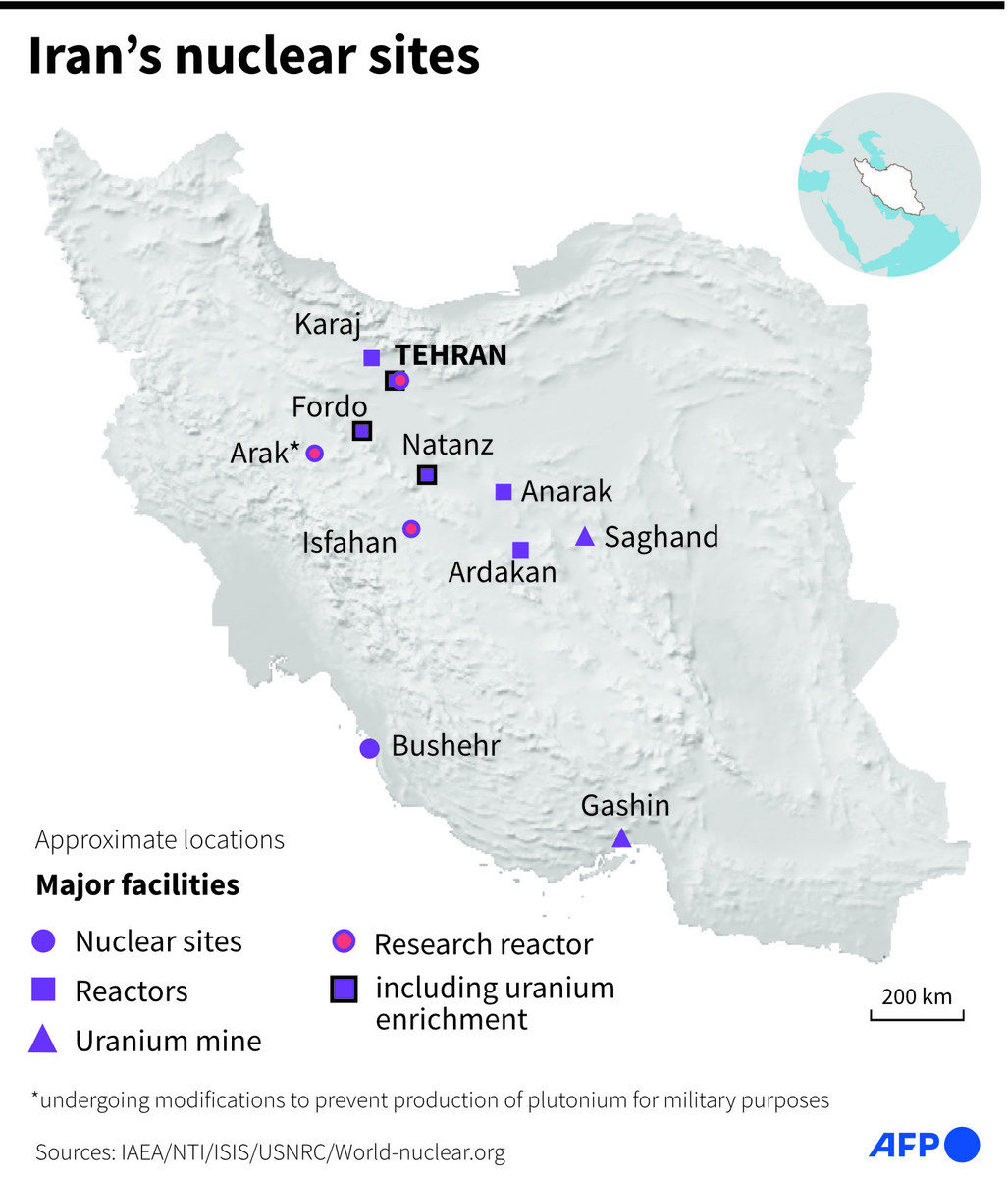
Meanwhile in Iraq where a number of Iranian-backed militias are based, residents in Baghdad reported hearing sounds of explosions, but the source of the noise was not immediately clear.
In Syria, a local activist group said strikes hit an army position in the south of the country Friday.
“There were strikes on a Syrian army radar position,” said Rayan Maarouf, who runs the Suwayda24 anti-government website that covers news from Sweida province in the south.
Iranian military positions in Syria had been frequently targetted by Israeli air strikes over the past years. Early this month, an Israeli strike demolished a consular building annex of the Iranian Embassy in Sydia's capital Damascus, killing 13 people, including two generals of Iran's Revolutionary Guards, triggering the Iranian missiles and drones attack on Israel on April 13.
At the United Nations Security Council on Thursday, Iran urged member nations that Israel “must be compelled to stop any further military adventurism against our interests” as the UN secretary-general warned that the Middle East was in a “moment of maximum peril.”
Israel had said it was going to retaliate against Iran’s April 13 missile and drone attack.
Analysts and observers have been raising concerns about the risks of the Israel-Gaza war spreading into the rest of the region.
Oil prices and jumped on the reports of the Israeli strike. Brent crude futures rose 2 percent to $88.86 a barrel, the dollar gained broadly, gold rose 1 percent and S&P 500 futures dropped 1 percent.
Israel’s assault on Gaza began after Palestinian Islamist group Hamas attacked Israel on Oct. 7, killing 1,200, according to Israeli tallies.
Israel’s military offensive has killed over 33,000 Palestinians in Gaza, according to the local health ministry.
Iran-backed groups have declared support for Palestinians, launching attacks from Lebanon, Yemen and Iraq.
Hamas slams US veto of Palestinian UN membership bid

PALESTINIAN TERRITORIES: Palestinian militant group Hamas condemned on Friday the US veto that ended a long-shot Palestinian bid for full United Nations membership.
“Hamas condemns the American veto at the Security Council of the draft resolution granting Palestine full membership in the United Nations,” the Gaza Strip rulers said in a statement, which comes amid growing international concern over the toll inflicted by the war in the besieged Palestinian territory.
The veto by Israel’s main ally and military backer had been expected ahead of the vote, which took place more than six months into Israel’s offensive in Gaza, in retaliation for the deadly October 7 attack by Hamas militants.
Twelve countries voted in favor of the draft resolution, which was introduced by Algeria and “recommends to the General Assembly that the State of Palestine be admitted to membership of the United Nations.” Britain and Switzerland abstained.
Gazans search for remains after deadly Rafah strike

- ‘We retrieved the remains of children and women, finding arms and feet. They were all torn to pieces’
An Israeli strike hit the home where a displaced Palestinian family was sheltering in the southern city of Rafah, relatives and neighbors said as they scraped at the soil with their hands.
Al-Arja said the blast killed at least 10 people.
“We retrieved the remains of children and women, finding arms and feet. They were all torn to pieces.
“This is horrifying. It’s not normal,” he said, hauling concrete and broken olive branches from the wreckage. “The entire world is complicit.”
Soon after the war began on Oct. 7, Israel told Palestinians living in the north of Gaza to move to “safe zones” in the territory’s south, like Rafah.
But Israeli Prime Minister Benjamin Netanyahu has since vowed to invade the city, where around 1.5 million people live in shelters, more than half the territory’s population.
“How is Rafah a safe place?” said Zeyad Ayyad, a relative of the victims. He sighed as he cradled a fragment of the remains.
“I heard the bombing last night and then went back to sleep. I did not think it hit my aunt’s house.”
The search for remains was long and painful. The strike left a huge crater and children picked through the rubble while neighbors removed debris, tarpaulin, a pink top.
“We can see them under the rubble and we’re unable to retrieve them,” Al-Arja said.
“These are people who came from the north because it was said the south is safe.”
“They struck without any warning,” he said.
In a separate strike on the house in Rafah’s Al-Salam neighborhood overnight on Tuesday, rescue crews recovered the corpses of eight family members, including five children and two women, Gaza’s civil defense service said.
“An Israeli rocket hit a house of displaced people,” said resident Sami Nyrab.
“My sister’s son-in-law, her daughter, and her children were having dinner when an Israeli missile demolished their house over their heads.”








